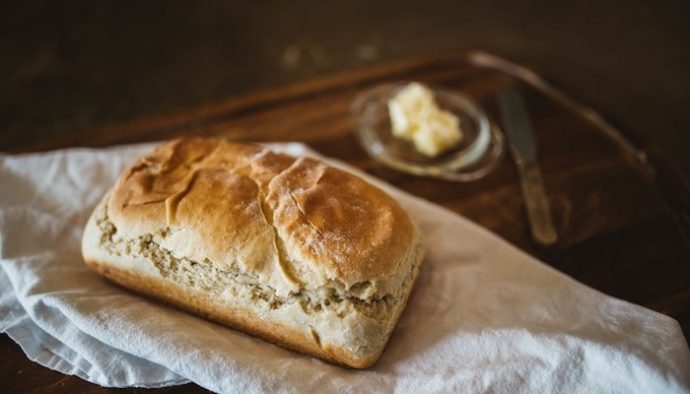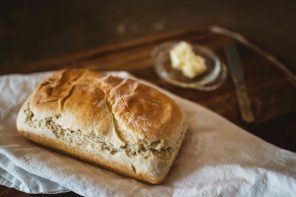“Give us this day, our daily bread…”
This is how the Lord Jesus taught us to pray, and there is a lot packed into these few words.
At its core, this line of what we call the Lord’s Prayer recognizes that God is our Provider. And it acknowledges that He is willing to give us what we need. Further, it’s good for us to see that Jesus told us to pray for bread, one of the basic staples of life for His original audience. We aren’t to trust God for extravagance, nor are we to treat Him like a cosmic genie who doles out comforts based on our momentary whims. We are to ask for bread – what we need – and trust God to give us what we need.
But implicit in this line from the Lord’s Prayer is also a sense of humility in the one doing the praying. We know that ultimately we can’t provide bread for ourselves. Ultimately, it is God alone who provides the basic stuff of life for us. But not only can we not provide what we need for ourselves, we actually don’t know what we need on a given day. When I think deeply about that fact, it’s incredibly humbling at best, and frightening at worst.
I woke up this morning with my calendar already set. I have weekly agenda items before me that always occur on this specific day of the week. So I got up, did my morning routine, and came to work with the general expectation of what would happen today. But the truth is that I don’t know what’s going to happen. I don’t know who is going to be hurt, or what challenges I might encounter. I don’t know how the world will change between midnight and midnight. But God does. And because He does, I can pray and ask Him for my daily bread, recognizing that the “bread” He provides might not be the same “bread” that I think I need at a given moment.
Now the problem comes when the provision that God, in His wisdom, has provided for me doesn’t match the provision that I have determined that I need. And like the Israelites of old, that’s when complaining in my heart sets in:
Contemptible people among them had a strong craving for other food. The Israelites cried again and said, “Who will feed us meat? We remember the free fish we ate in Egypt, along with the cucumbers, melons, leeks, onions, and garlic. But now our appetite is gone; there’s nothing to look at but this manna!”
The manna resembled coriander seed, and its appearance was like that of bdellium. The people walked around and gathered it. They ground it on a pair of grinding stones or crushed it in a mortar, then boiled it in a cooking pot and shaped it into cakes. It tasted like a pastry cooked with the finest oil. When the dew fell on the camp at night, the manna would fall with it.
Moses heard the people, family after family, crying at the entrance of their tents. The Lord was very angry; Moses was also provoked (Numbers 11:4-10).
The people had, for some time, been receiving their daily bread from God as they moved out of Egypt and through the desert on their way to the promised land. And God, in His provision, had been very explicit about how this bread was to be gathered. When it fell from heaven each morning, each person was to take what they needed for the day. If they took more, then it would spoil. This was the system of provision God had instituted, and it worked, right up until the point that the people decided they did not like the daily bread God had given. They wanted a different kind of provision, something more to their own tastes and sensibilities. So the complaining began, and so it begins with us.
We look around at our circumstances, and then the way God has provided for us in those circumstances, and we complain:
- Not this means of income. We want a more satisfying one.
- Not this home to live in. We want a bigger one.
- Not this care to drive. We want a flashier one.
- Not this church to help us follow Jesus. We want one with a different format.
And the list could go on. If we look back to the Israelites, we see that the Lord was very angry. Was He angry because complaining is annoying? Perhaps. But maybe His anger was at a deeper level than mere annoyance with this stiff-necked people. That’s because a complaint against the provision of God is a charge against the character of God.
When we look at the daily bread God has provided and rebel against it, demanding something “other” than what He has chosen to rain down from heaven for us, then we are implicitly making a charge against who He is. We are saying that God is not loving. Or that God is not generous. Or that God is not wise enough to know what we really need. In all cases, we are leveling a charge against the character of God, for His character is displayed in the way that He provides for His children.
This is sobering for me to think about during all the times when I look at the bread in my hands and wish it tasted a little bit different. It’s sobering for me to consider that my issue is not so much with the bread itself as it is whether or not I truly believe that my Heavenly Father is loving, generous, and wise. And this makes me think twice about how I react when I move throughout the day in the midst of God’s provision.
Pray, Christian, for your daily bread. I’m praying for mine, too. But let’s also make it a discipline to give thanks for that bread, just as it is, for in doing so we are bending our hearts to acknowledge that God knows what kind of bread we need more than we do.
Subscribe to MichaelKelley.co
Never miss a new post. Subscribe to receive these posts in your inbox and to receive information about new discipleship resources.






1 Comment